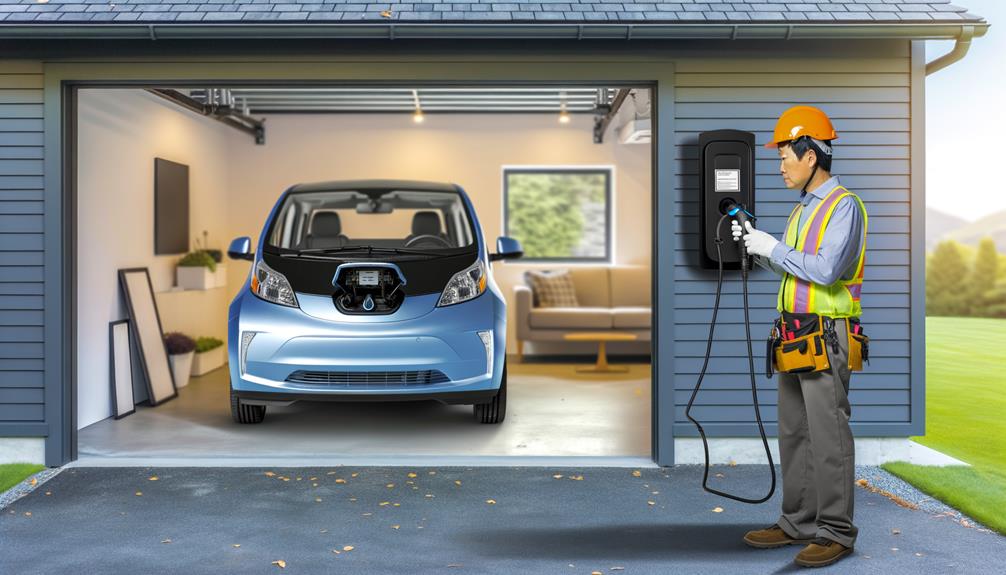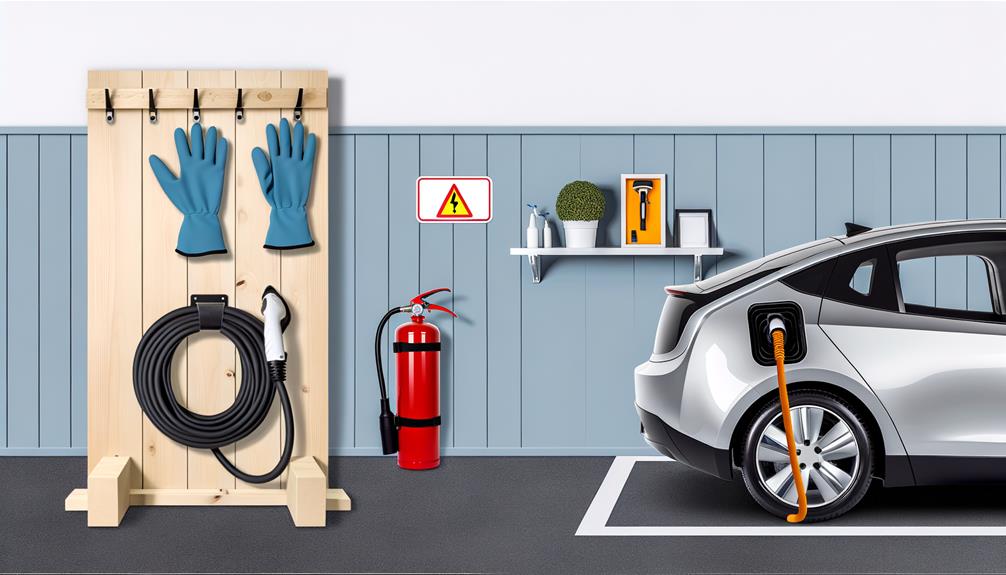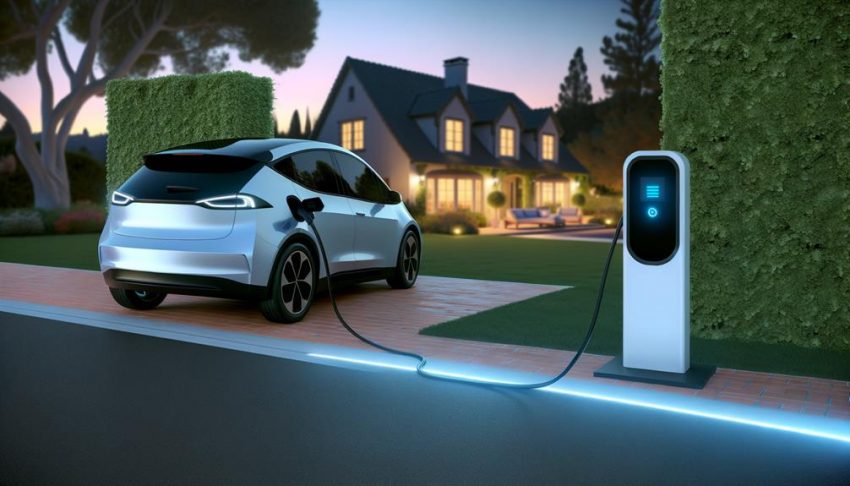Charging an electric car at home isn't as complicated as it might seem, but it does require some planning. You'll need to decide between Level 1 and Level 2 charging, with each offering different speeds and conveniences. A standard 120-volt outlet might suffice for occasional use, but a 240-volt installation considerably reduces charging times. Furthermore, ensuring the installation meets local regulations is essential for safety. Curious about how to keep your electricity bill in check while charging your vehicle? Let's explore the best practices and tips for making the most of your home charging setup.
Contents
Understanding Charging Levels
Understanding the different charging levels for your electric vehicle (EV) is vital for enhancing your charging strategy. Home charging mainly involves Level 1 and Level 2 charging, each with distinct characteristics and benefits.
Level 1 charging uses a standard 120-volt outlet, similar to what you'd use for household appliances. This method is the most basic form of charging, delivering approximately 9 km of range per hour. Though it's the slowest, Level 1 charging is convenient because the charging equipment is portable and often included with your EV. You'll find the vehicle supply equipment (EVSE) in your car's trunk, allowing you to charge your electric car anywhere there's a standard outlet. While it may take several hours or even overnight to achieve a full charge, Level 1 charging is ideal for those who drive short distances daily.
Level 2 charging, on the other hand, operates at 240 volts and greatly improves charging speed. It can add around 45 km of range per hour, allowing you to charge up to 80% in 4 to 5 hours. For best performance and safety, Level 2 chargers require professional installation by a certified electrician. The charging equipment is more robust, making it suitable for those who need faster charging times to accommodate longer daily commutes. Evaluating your vehicle's onboard charger is essential since it determines the maximum charging rate, ensuring you maximize the benefits of Level 2 charging.
Installing a Home Charging Station
Installing a home charging station transforms your garage or driveway into a convenient fueling hub for your electric vehicle. Opting for a Level 2 (240 V) charging station greatly reduces charging times, enabling up to 80% charge in just 4 to 5 hours. To start, you'll need a certified electrician to guarantee the installation complies with local building codes and safety regulations.
When selecting home charging equipment, you have multiple options. Wall-mounted options provide a permanent solution, while portable charging units offer flexibility if you plan to charge at different locations. Confirm the electric vehicle supply equipment you choose is compatible with your specific electric vehicle.
The cost of installation typically hovers around £849, and the process can be completed in about three hours by qualified installers. However, this cost can vary based on the complexity of your electrical system and the specific equipment you choose. Fortunately, state and utility incentives may be available to help offset these expenses, making it a financially viable option.
It's vital that the installation is performed by a certified electrician, not just for compliance with safety regulations, but also to guarantee peak performance and longevity of your charging station. Improper installation can lead to inefficiencies or even hazards.
Complying With Regulations

Before you can charge your electric vehicle at home, it is vital to comply with local and state building codes and regulations. The process starts with understanding and adhering to these regulations to guarantee both safety and compliance. First, you'll need to obtain a permit from your local building and permitting authorities. This permit is a significant step that allows you to proceed with the installation of your home charger.
The National Electrical Code (NEC) views EV charging as a continuous load, which requires careful planning. Specifically, NEC Article 625 outlines the necessary guidelines for the safe installation of charging equipment. Your site installation plans must be approved by relevant authorities before any work begins. This step guarantees that your setup meets all local building codes and regulatory requirements.
Engaging a certified electrician is vital. A certified electrician will not only guarantee that your charging equipment is installed safely but also that it complies with all pertinent regulations. Their expertise in site installation plans will help you avoid potential pitfalls that could delay your project or lead to non-compliance issues.
Additionally, the certified electrician will help you navigate the intricacies of the NEC Article 625, making sure your installation meets the standard for continuous load requirements. This professional guidance is invaluable for guaranteeing that your home charger is safe and efficient.
Managing Electricity Costs
Managing electricity costs for charging your electric vehicle (EV) at home can notably impact your overall expenses. To guarantee you're getting the best value, consider the following strategies.
- Understand Electricity Rates: The average cost of electricity in the UK is around 24.5p per kWh. Charging an electric car with a 54 kWh battery from empty to full typically costs about £6. While this indicates the affordability of home charging compared to traditional fuels, it's essential to be aware of fluctuating energy prices. Verify current rates with your provider regularly to stay informed.
- Utilize Off-Peak Tariffs: Opting for specific tariffs like Economy 7 can considerably reduce your charging expenses. Economy 7 offers lower rates during off-peak hours, sometimes as low as 11p per kWh. By scheduling your home charging during these off-peak times, you can lower the cost of charging your EV substantially.
- Smart Charging Solutions: Leveraging smart charging solutions can optimize your charging expenses even further. For instance, Pod Point offers a tariff that can bring costs down to 8.49p per kWh. These solutions often include features that allow you to set charging times to align with the cheapest electricity rates, maximizing savings.
Practical Steps to Reduce Charging Costs
- Monitor and Compare Tariffs: Regularly check and compare electricity rates from different providers.
- Schedule Off-Peak Charging: Use timers or smart chargers to charge your EV during off-peak hours.
- Invest in Smart Charging Solutions: Consider providers like Pod Point for tailored tariffs and features that reduce costs.
Safety and Maintenance Tips

Ensuring the safety and maintenance of your electric vehicle charging setup is essential for both efficiency and longevity. Regular inspection of your charging equipment is important. Look for any signs of wear or damage to prevent potential hazards. This simple step can help you catch issues before they escalate into costly repairs or safety risks.
Always enlist certified electricians for installation. They'll make sure your setup complies with local regulations and the National Electrical Code (NEC), specifically Article 625, which covers EV charging installations. Proper grounding and circuit protection are critical for safe operation, preventing electrical faults and making sure efficient energy transfer.
Smart chargers offer an added layer of convenience and safety. They can send alerts for maintenance needs, keeping you informed about the condition of your charging system. This proactive approach can help you address issues promptly, maintaining peak performance.
Following manufacturer guidelines is non-negotiable. These guidelines provide detailed instructions on usage and maintenance schedules tailored for your specific charging equipment. Adhering to these recommendations guarantees you're operating within safe parameters and maximizing the lifespan of your equipment.
Don't overlook the importance of proper grounding and circuit protection. These elements are fundamental to preventing electrical hazards. Your certified electrician will make sure these are correctly implemented during installation, providing a robust and safe charging environment.
Regular inspection and adherence to guidelines not only enhance safety but also guarantee your EV charging setup remains reliable. By integrating these practices, you're investing in the long-term efficiency and safety of your home charging station.
Frequently Asked Questions
Can You Plug an Electric Car Into a Regular Outlet?
Yes, you can plug an electric car into a regular outlet. However, consider charging speed, power requirements, safety precautions, outlet compatibility, and circuit capacity. Using extension cords may reduce energy efficiency. Charging adapters can help with home wiring and charging costs.
Is It Expensive to Charge an Electric Car at Home?
Charging costs vary based on energy rates and your charging habits. Home installation can optimize charging speed and battery efficiency. Using off-peak electric rates and government incentives, you'll see significant cost savings in your power usage.
What Is Needed to Charge an Electric Car at Home?
You'll need charging equipment, proper home wiring, and possibly a certified electrician for the installation process. Consider charging speed, safety measures, and cost. Look into energy sources, maintenance tips, government incentives, and user experience for best practices.
Can You Charge an Electric Car From a Home Socket?
Yes, you can use home charging for your electric vehicle through a standard socket. However, charging speed is slow. Verify outlet compatibility, avoid extension cords for charging safety, and consider installation options like Level 2 for better efficiency.
Conclusion
Charging your electric car at home is straightforward if you choose the right charging level and install a home station professionally. Guarantee compliance with local regulations, monitor electricity costs, and take advantage of off-peak tariffs. Regularly maintain your equipment for peak performance and safety. By following these guidelines, you'll enjoy the convenience of fast, efficient, and safe home charging for your electric vehicle.
